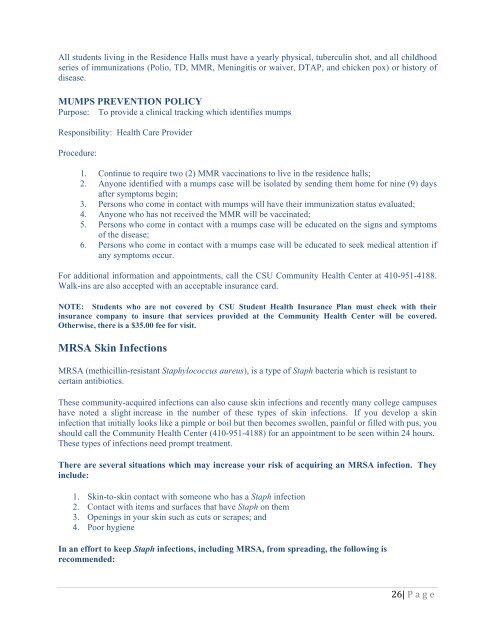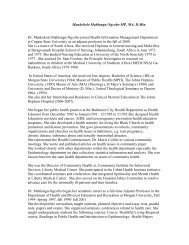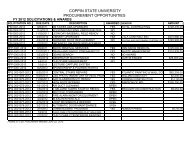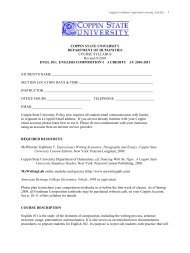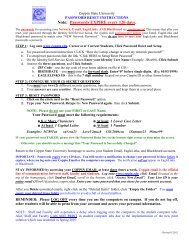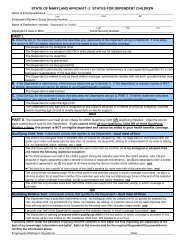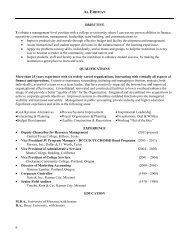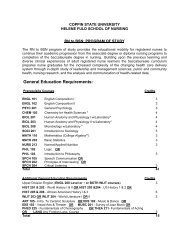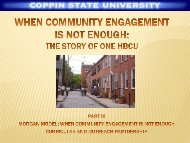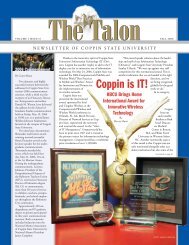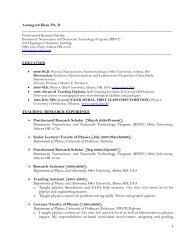Eagle Guide Student Handbook - Coppin State University Homepage
Eagle Guide Student Handbook - Coppin State University Homepage
Eagle Guide Student Handbook - Coppin State University Homepage
You also want an ePaper? Increase the reach of your titles
YUMPU automatically turns print PDFs into web optimized ePapers that Google loves.
All students living in the Residence Halls must have a yearly physical, tuberculin shot, and all childhood<br />
series of immunizations (Polio, TD, MMR, Meningitis or waiver, DTAP, and chicken pox) or history of<br />
disease.<br />
MUMPS PREVENTION POLICY<br />
Purpose: To provide a clinical tracking which identifies mumps<br />
Responsibility: Health Care Provider<br />
Procedure:<br />
1. Continue to require two (2) MMR vaccinations to live in the residence halls;<br />
2. Anyone identified with a mumps case will be isolated by sending them home for nine (9) days<br />
after symptoms begin;<br />
3. Persons who come in contact with mumps will have their immunization status evaluated;<br />
4. Anyone who has not received the MMR will be vaccinated;<br />
5. Persons who come in contact with a mumps case will be educated on the signs and symptoms<br />
of the disease;<br />
6. Persons who come in contact with a mumps case will be educated to seek medical attention if<br />
any symptoms occur.<br />
For additional information and appointments, call the CSU Community Health Center at 410-951-4188.<br />
Walk-ins are also accepted with an acceptable insurance card.<br />
NOTE: <strong>Student</strong>s who are not covered by CSU <strong>Student</strong> Health Insurance Plan must check with their<br />
insurance company to insure that services provided at the Community Health Center will be covered.<br />
Otherwise, there is a $35.00 fee for visit.<br />
MRSA Skin Infections<br />
MRSA (methicillin-resistant Staphylococcus aureus), is a type of Staph bacteria which is resistant to<br />
certain antibiotics.<br />
These community-acquired infections can also cause skin infections and recently many college campuses<br />
have noted a slight increase in the number of these types of skin infections. If you develop a skin<br />
infection that initially looks like a pimple or boil but then becomes swollen, painful or filled with pus, you<br />
should call the Community Health Center (410-951-4188) for an appointment to be seen within 24 hours.<br />
These types of infections need prompt treatment.<br />
There are several situations which may increase your risk of acquiring an MRSA infection. They<br />
include:<br />
1. Skin-to-skin contact with someone who has a Staph infection<br />
2. Contact with items and surfaces that have Staph on them<br />
3. Openings in your skin such as cuts or scrapes; and<br />
4. Poor hygiene<br />
In an effort to keep Staph infections, including MRSA, from spreading, the following is<br />
recommended:<br />
26| P age


